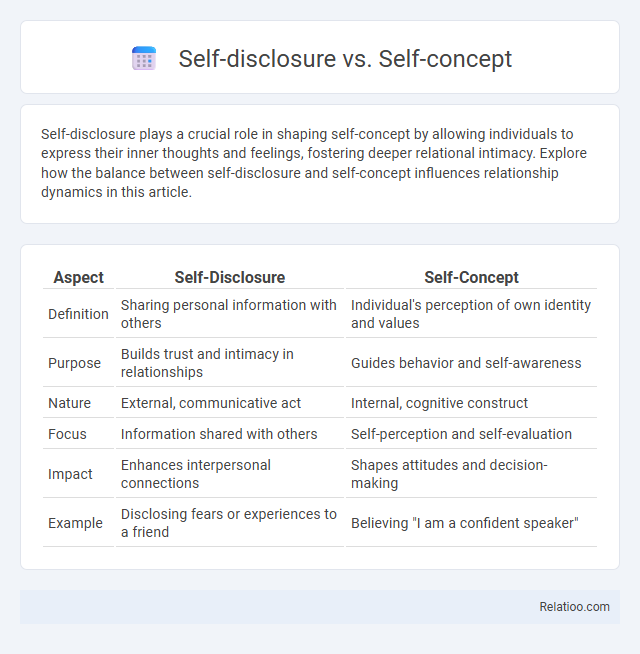Self-disclosure plays a crucial role in shaping self-concept by allowing individuals to express their inner thoughts and feelings, fostering deeper relational intimacy. Explore how the balance between self-disclosure and self-concept influences relationship dynamics in this article.
Table of Comparison
| Aspect | Self-Disclosure | Self-Concept |
|---|---|---|
| Definition | Sharing personal information with others | Individual's perception of own identity and values |
| Purpose | Builds trust and intimacy in relationships | Guides behavior and self-awareness |
| Nature | External, communicative act | Internal, cognitive construct |
| Focus | Information shared with others | Self-perception and self-evaluation |
| Impact | Enhances interpersonal connections | Shapes attitudes and decision-making |
| Example | Disclosing fears or experiences to a friend | Believing "I am a confident speaker" |
Understanding Self-Disclosure
Self-disclosure involves sharing personal information, thoughts, and feelings with others, which plays a crucial role in building trust and intimacy in relationships. It differs from self-concept, which refers to an individual's perception and understanding of themselves, including beliefs, values, and identity. Understanding self-disclosure requires recognizing its impact on social interactions and how it can influence self-concept by shaping how individuals perceive themselves through feedback and social validation.
Defining Self-Concept
Self-concept is the comprehensive understanding and perception you hold about yourself, encompassing your beliefs, attributes, and values. It shapes how you interpret experiences and influences your emotional and social behavior. Unlike self-disclosure, which involves sharing personal information with others, self-concept remains an internal framework that guides your identity and self-awareness.
The Relationship Between Self-Disclosure and Self-Concept
Self-disclosure significantly influences self-concept by allowing individuals to express and explore their identities through sharing personal information. As people reveal thoughts, feelings, and experiences, they receive feedback that helps shape and refine their self-concept over time. The dynamic interaction between self-disclosure and self-concept fosters deeper self-awareness and emotional growth within interpersonal relationships.
Types of Self-Disclosure
Types of self-disclosure include verbal communication, nonverbal cues, and digital sharing, each revealing different layers of your thoughts, feelings, and experiences. Self-concept influences how and what you choose to disclose, as it shapes your understanding of yourself and impacts the authenticity of your disclosures. Balancing self-disclosure with self-concept ensures that your shared information aligns with your personal identity and social context.
Factors Influencing Self-Concept
Self-concept is shaped by factors such as social interactions, personal experiences, and cultural background, which influence how individuals perceive themselves. Self-disclosure involves sharing personal information with others, impacting relationships and social feedback that can modify self-concept over time. Understanding the interplay between self-disclosure and self-concept reveals how external validation and internal reflection collaboratively shape identity formation.
Benefits of Self-Disclosure in Communication
Self-disclosure enhances interpersonal communication by fostering trust and deepening relationships, which supports the positive development of self-concept. Sharing personal thoughts and feelings allows individuals to clarify their self-identity and receive feedback, reinforcing self-awareness and emotional well-being. The benefits of self-disclosure include improved empathy, conflict resolution, and emotional support, which are essential for effective and meaningful communication.
Risks and Boundaries of Self-Disclosure
Self-disclosure involves revealing personal information, which can enhance intimacy but also poses risks such as privacy invasion and emotional vulnerability. Maintaining clear boundaries is essential to protect one's self-concept, the internal perception of identity shaped by thoughts and beliefs. Balancing openness and discretion safeguards mental well-being and preserves trust in interpersonal relationships.
Impact of Self-Concept on Interpersonal Relationships
Self-concept shapes how you perceive yourself and influences your communication patterns in interpersonal relationships, affecting the depth and authenticity of self-disclosure. A positive self-concept encourages openness and trust, leading to stronger emotional connections and effective conflict resolution. Conversely, a negative self-concept may result in guarded interactions and limited self-disclosure, hindering relationship development and intimacy.
Strategies for Healthy Self-Disclosure
Healthy self-disclosure requires balancing openness with boundaries to protect personal well-being and maintain trust in relationships. Strategies include gradually sharing information based on the level of intimacy, ensuring disclosures align with one's self-concept to maintain authenticity, and being mindful of the context and potential risks involved. Clear communication, active listening, and mutual respect enhance the effectiveness of self-disclosure while supporting a positive self-concept.
Enhancing Self-Concept Through Self-Reflection
Self-disclosure refers to the process of revealing personal information to others, which can influence one's self-concept--the overall perception and evaluation of oneself. Engaging in deliberate self-reflection fosters a deeper understanding of personal values, beliefs, and emotions, thereby enhancing self-concept by aligning self-perception with authentic experiences. This alignment promotes psychological well-being and increased self-awareness, leading to more meaningful self-disclosure in social interactions.

Infographic: Self-disclosure vs Self-concept
 relatioo.com
relatioo.com